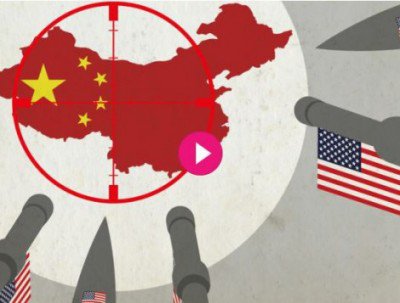The Trump Administration’s Disturbing US Anti-China Saber Rattling

Saber rattling by Trump administration officials on China give pause for concern, continuing Obama’s hostile approach, risking direct confrontation if not curbed.
At his Senate confirmation hearing, Secretary of State designee Rex Tillerson recklessly said “(w)e are going to have to send China a clear signal that, first, the island-building stops and second, your access to those islands also is not going to be allowed.”
He belligerently accused China of “declaring control of territories…not rightfully” its own. Secretary of Defense James (“mad dog”) Mattis defiantly said Beijing’s activities in the South China Sea threaten the global order…”under the biggest attack since world war two…”
On Wednesday, China’s Global Times published a Xinhua commentary “urg(ing) (the) US to watch how it talks about the South China Sea issue,” its islands and territorial waters.
Beijing was angered by White House press secretary Sean Spicer, saying “it’s a question of if those islands are in fact in international waters and not part of China property, then yeah, we’re going to make sure that we defend international territories from being taken over by one country.”
China’s Foreign Ministry spokesman Hua Chunying said Beijing is committed to defend its islands, adjacent waters, maritime rights and sovereignty while pursuing regional peace and stability.
On Monday, acting South Korea President and Prime Minister Hwang Kyo Ahn confirmed US plans to install provocative Terminal High Altitude Area Defense (THAAD) missile systems on its territory – aimed at China and Russia, a nonexistent North Korea threat cited as pretext.
Beijing responded to US provocations initiated by Obama, continuing under Trump, by deploying advanced DF-41 ICBMs in Heilongjiang province bordering Russia – able to strike America with multiple thermonuclear warheads, perhaps additional deployments to follow elsewhere in the country.
China’s Global Times suggested the deployment coincided with Trump’s inauguration, “respond(ing) to (his) provocative remarks on trade, its currency and offshored US jobs.
“Beijing will ready itself for pressures imposed by the new US government,” said GT. “China bears the heavy task of safeguarding (its) national security.”
“(H)ow can China be content with its current nuclear strength when it is viewed by the US as its biggest potential opponent?”
“China’s nuclear capability should be so strong that no country would dare launch a military showdown with China under any circumstance, and such that China can strike back against those militarily provoking it. A military clash with the US is the last thing China wants, but China’s nuclear arsenal must be able to deter the US.”
Responding to Beijing’s deployment, Putin spokesman Dmitry Peskov said “(w)e do not regard China’s efforts to develop its armed forces as a threat, and even if…information (about deploying ICBMs near Russia’s border) is true, we see no risks for our country.”
“China is our strategic ally and our partner in political, trading and economic term. We appreciate our relations,” Peskov stressed.
Trump has been in office less than a week. His policy agenda toward China hasn’t been revealed so far by specific actions.
If hostile rhetoric by him and key administration officials is indicative of things to come, it will adversely affect US relations with China, Russia and perhaps other countries.
World peace remains threatened as long as US geopolitics remains confrontational. Brinksmanship between thermonuclear powers is a potential doomsday scenario if pursued.
Stephen Lendman lives in Chicago. He can be reached at [email protected].
His new book as editor and contributor is titled “Flashpoint in Ukraine: How the US Drive for Hegemony Risks WW III.” http://www.claritypress.com/LendmanIII.html
Visit his blog site at sjlendman.blogspot.com.
Listen to cutting-edge discussions with distinguished guests on the Progressive Radio News Hour on the Progressive Radio Network.

